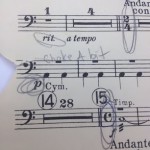
In music ensembles, I’m given pages of marked-up, wrinkled pieces. People cross out entire measures, add in parts that didn’t previously exist, or change the dynamics and tempo of the piece without much explanation. When the piece gets to me, possibly after years of use, I get to see the many different interpretations of one musical composition and add my own comments.
As Casey has posted about in reference to Shakespeare, edits can change the meaning of a single text, and this is true with music pieces too. Take these two videos of cellists taking on the same piece, for instance – one performer uses a traditional approach, while the other incorporates beatboxing. Who is to say that one version is more valid than another?
Every time a piece is performed, it’s likely to be interpreted slightly differently by each individual conductor and player. Often, we learn about the composer’s original intent before playing the piece, but so many small changes and revisions are made each time it’s performed that you could say there are countless versions of every musical “text.”
In my opinion, the collaborative nature of a music score is comparable to digital humanities. I think of a music score as a fluid text, much like the digital Walden texts we use that allow readers to trace the various manuscript changes or leave their own thoughts in the margins. As Jack Stillinger argues in “A Practical Theory of Versions,” textual pluralism (what he calls the idea that every version of a work should be considered) is becoming more possible with digital efforts such as these. With music pieces, glancing at a marked-up copy of sheet music or listening to different performers can show you a wealth of interpretations that you may not have considered on your own. Working with digital literature seems to have similar benefits – I not only learn from Walden itself, but from the record of its changes over time and my fellow classmates’ varied thoughts about the text.
